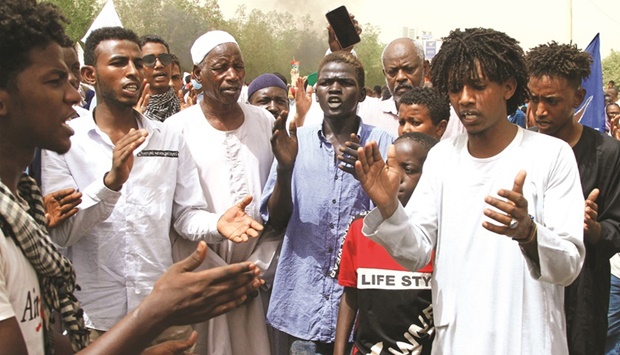Security forces shot a protester dead in Sudan’s capital yesterday, medics said, as pro-democracy demonstrators demanded justice for those killed in a bloody crackdown three years ago to the day.
Thousands took to the streets in Khartoum and other cities to commemorate the 128 people who medics say were killed when armed men in military fatigues violently dispersed a months-long sit-in outside army headquarters.
The latest demonstrations came as UN human rights expert Adama Dieng visited Sudan and urged authorities to “refrain from use of excessive force”. The protests in 2019 were crucial to pressing the military into sharing power with civilians in the wake of the ouster in April that year of long-time ruler Omar al-Bashir.
But a military coup led by army chief Abdel Fattah al-Burhan in October last year derailed that fragile political transition, and protesters have returned to the streets at least weekly since then — often in the face of renewed deadly force.
“Blood for blood,” protesters in Khartoum chanted, while others urged the military “to go back to their barracks”. The police released a statement accusing demonstrators of attacking police stations, wounding policemen and causing damage. Amna Behiri, whose son Abdel Salam Kesha was one of the demonstrators killed three years ago, joined one of the rallies yesterday wearing a shirt emblazoned with a print of her son’s face.
“We want justice before anything else,” she said. “Without justice, we can’t have a democratic state.”
An investigation was launched into the June 2019 crackdown later that year, but even before last year’s military power grab, it struggled to make headway and it is still to announce its findings.
“We lost youth who were dear to the people of Sudan,” said Diaa Eddine, whose nephew was also killed in the crackdown three years ago. “With this anniversary, God willing, the Sudanese revolution will win.”
Britain, Norway and the United States issued a tripartite statement yesterday “calling for the prompt resolution of the government-appointed investigation into the (2019) massacre and disclosure of findings to the public.”
A bloody crackdown since last year’s coup has killed nearly 100 more people, according to pro-democracy medics. Dieng’s visit is his second since Burhan’s power grab. Burhan has said some security force members have “misused” their weapons during demonstrations since October, but no trials of personnel have been publicly announced.
Yesterday, UN special representative Volker Perthes announced the Security Council had voted to extend by one year the United Nations’ mission in Sudan.
The UN, along with the African Union and regional grouping IGAD, have been pushing to facilitate Sudanese-led talks to resolve the crisis.
On Wednesday, military officials met with UN, AU and IGAD representatives and agreed to launch “direct talks” among Sudanese factions next week. On Sunday, Burhan lifted a state of emergency in force since the coup to set the stage for “meaningful dialogue that achieves stability for the transitional period”. Since April, Sudanese authorities have released a several civilian leaders and pro-democracy activists.

Sudanese demonstrators take the streets in Khartoum yesterday to demand justice for scores of pro-democracy protesters killed during the suppression of a 2019 sit-in against now ousted ruler Omar al-Bashir.
